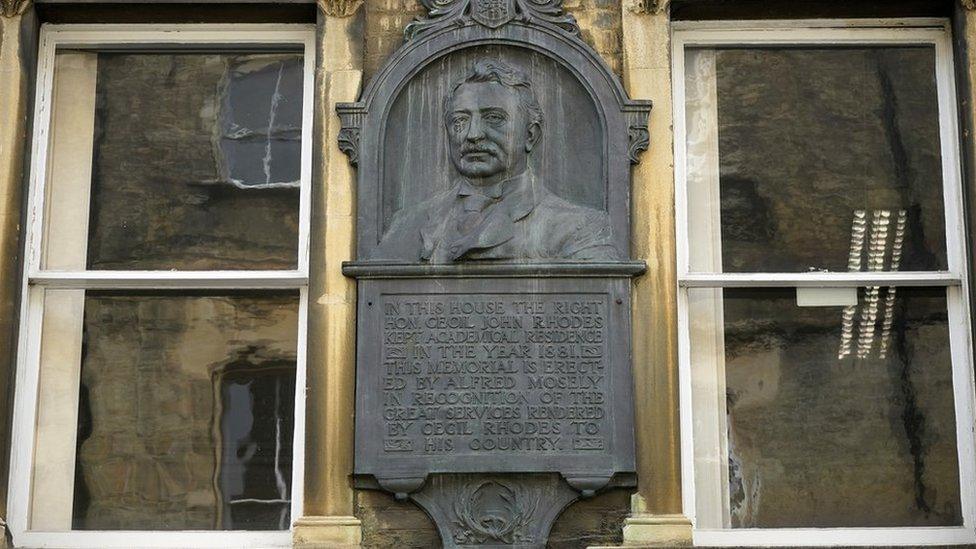Rhodes Trust criticised for 'uncomfortable' slavery talk
- Published
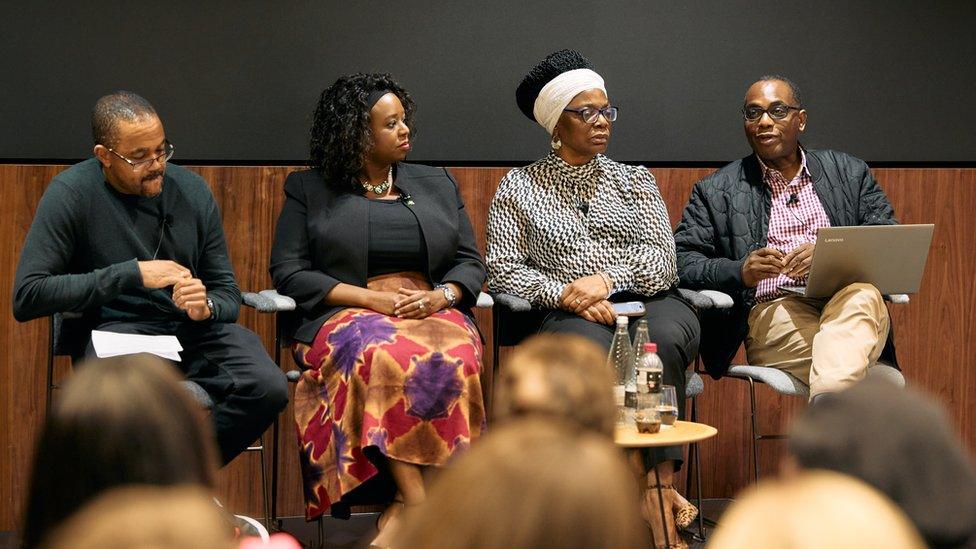
Professor Kehinde Andrews, who chaired the panel, said the house felt "proud to be Rhodes"
A prestigious Oxford University scholarship programme has been accused of celebrating its colonial history.
The Rhodes Trust, founded by imperialist Cecil Rhodes, held a talk on the Atlantic Slave Trade following a £38m renovation of Rhodes House.
Speakers at the event, held on 12 October, criticised the "difficult" and "uncomfortable" experience.
Trust chief executive Dr Elizabeth Kiss said it was committed to becoming "ever-more inclusive and diverse".
However, several members of the panel said the event was a reminder that colonialism "carries on".
The talk was part of a series of events - including a photography exhibition titled Cecil John Rhodes: Hero, Villain, Ruthless Exploiter or Unjustly Accused? - hosted by the trust.
Rhodes was a colonialist, businessman and politician who drove the annexation of land in southern Africa in the late 19th Century in Zimbabwe and Zambia, then named Rhodesia.
In 2020, after the death of George Floyd, conversations around colonisers like Rhodes came to a head with the decapitation of his statue in South Africa and the #RhodesMustFall campaign in Oxford.
It sparked similar protests against Oriel College's statue and the university's connections with colonialism and historically white intake.
In 2022, 85 black students were admitted to the university, 3.3% of the total intake, down from a record 3.7%, external in 2020.
Thousands of people gathered outside an Oxford college to demand the removal of a statue of Cecil Rhodes
Dr Kiss said the renovations to Rhodes House, which include a new sculptural spiral staircase, 37 en-suite bedrooms, and feature gardens redesigned by Christopher Bradley-Hole, would make it a "vibrant hub".
But Prof Kehinde Andrews, who chaired the trust's inaugural panel on the Atlantic Triangle, said the new space felt "uncomfortable".
He said: "The logo feels like Rhodesia. Unfortunately, this is an example of how colonialism carries on.
"At the end of the day it doesn't mean we should celebrate it, and to be honest, I feel like this place celebrates it."
Onyekachi Wambu, executive director of the African Foundation for Development (AFFORD), was another panel member who said the organisation "perpetuate[s] imperialism".
He said: "I had to think really hard about going into Rhodes House. I think my analogy is a Jewish person being invited to talk in a building that is named after Hitler.
"Emblems are important - one of the first things that was done when Blair and Bush went into Iraq was to pull down the statue of Saddam [Hussein] - so we understand the importance of symbols."
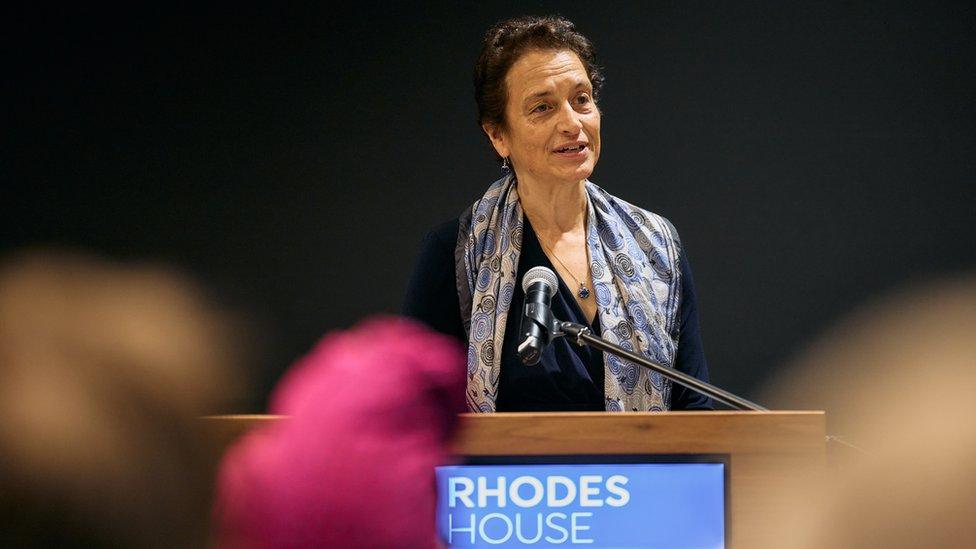
Dr Elizabeth Kiss said the trust had undergone unconscious bias training and "worked really hard to diversify our selection committees"
The Rhodes scholarship was designated for "young colonists [...] as an educational trust for the benefit of the Empire".
The first African American scholar was chosen in 1907, four years after the scholarship began. There was not another until 1962.
Today, there are 20 scholarships per year designated for students from African countries, compared to 32 for the United States.
Dr Kiss said the African continent is the "single largest priority" for the trust's current goal to achieve 125 Rhodes scholarships by their 125th birthday in 2028.
"It's a commitment to reparative action. The wealth was generated in Africa and most of its beneficiaries are like me, people from North America, and we want to rebalance that," she said.
Previous Black Rhodes Scholars, including some #RhodesMustFall activists, have been openly critical of the founder.
Muloongo Muchelemba, a 2002 Zambian Rhodes Scholar, said: "I don't see it as Cecil's money. This is wealth that was generated by my ancestors and therefore, it is my money."
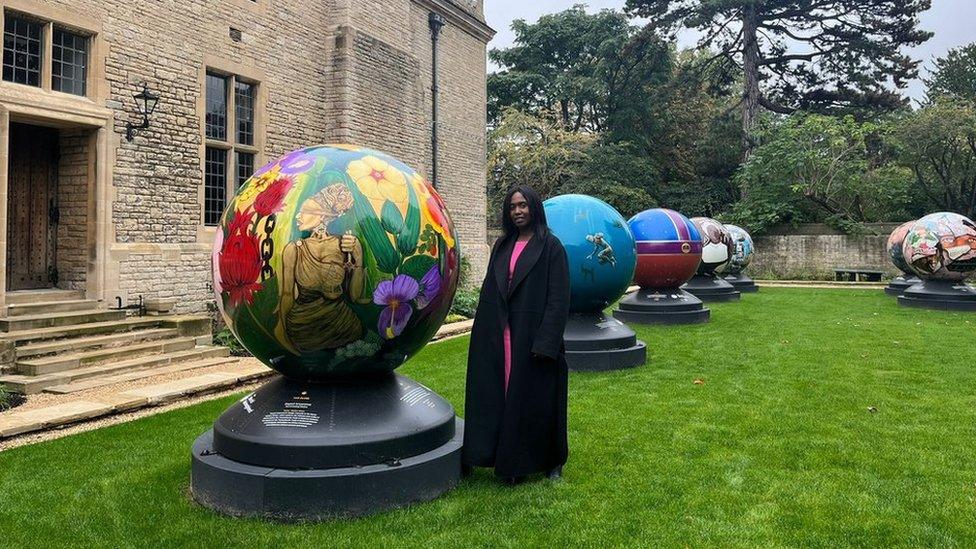
The World Reimagined, co-founded by Mchelle Gayle, displayed its newest art project on the Rhodes House grounds
Charity The World Reimagined, which works to educate the public on the transatlantic slave trade, organised the talk.
It was co-founded by actress and singer Michelle Gayle, who said she hopes the project will fill "a gap in education".
"How do we unpick the things that are still in place now without acknowledging our history?" she said.
"We wanted to bring everyone to the table. We didn't want it to be a finger pointing exercise. We're not blaming anyone."
Mr Andrews, Professor of Black Studies in the School of Social Sciences at Birmingham City University, said universities are "complicit" in colonial erasure.
"All of these mechanisms are built on slavery and colonialism," he said.
"I've been through every level of the school system, and the only time I've heard the word empire in a classroom has been when it is coming out of my mouth."
He said this means figures like Rhodes could be everywhere and "no-one says it is terrible because no-one knows, otherwise people would say he's not appropriate to be the head of anything".
Dr Kiss said: "We hope that the transformed Rhodes House, and the new spaces created as part of the redevelopment, will help to accelerate the trust's ability to foster a diverse and inclusive community of outstanding scholars and fellows who are committed to building a better world."

Follow BBC South on Facebook, external, X, external, or Instagram, external. Send your story ideas to south.newsonline@bbc.co.uk.
Related topics
- Published23 November 2022
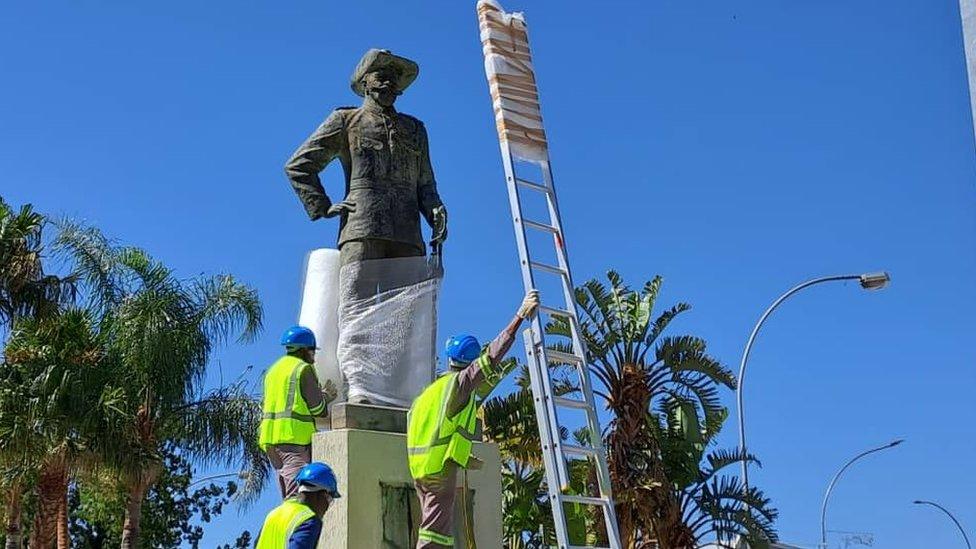
- Published28 July 2022
